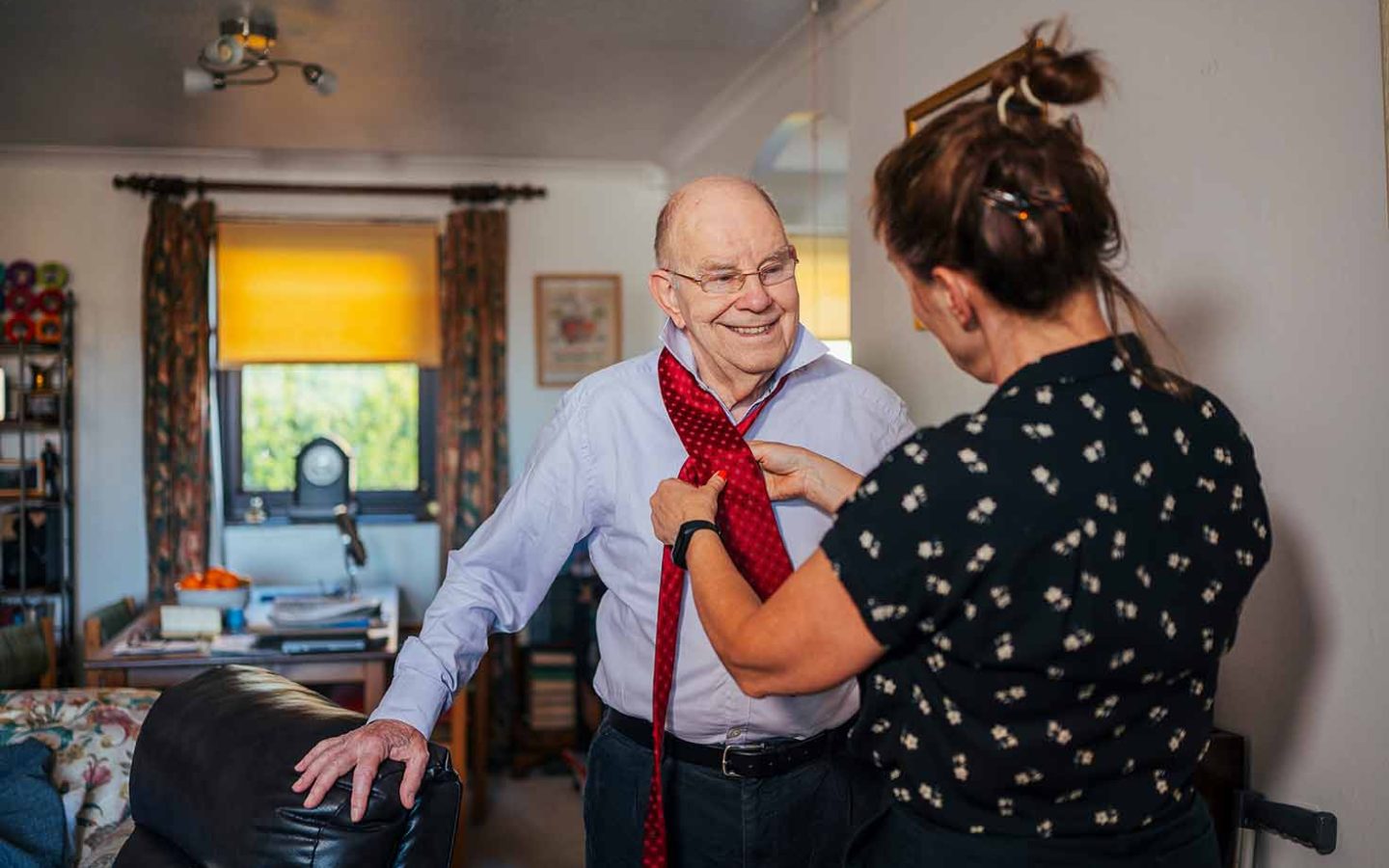In our new report, published today for Carers Rights Day, we have collaborated with Carers NI to estimate the value of the contributions of unpaid carers.
Findings
The report, written by Centre for Care colleagues Jingwen Zhang, Maria Petrillo and Matt Bennett finds that;
- People providing unpaid care for sick or disabled family members and friends are saving Northern Ireland’s health service £5.8 billion in care costs each year.
- The care they are providing for their loved ones would cost Health Trusts a combined £16 million every day, or more than half a million pounds (£0.7 million) each hour, if it was being delivered by staff – an increase of over 40% in the last decade.
- In total, unpaid carers in Northern Ireland are saving the equivalent of 80% of the Department of Health’s entire day-to-day spending budget for 2023-24.
About the report
This Carers Rights Day we have collaborated with Carers Northern Ireland on a report aiming at providing an economic evaluation of the cost of unpaid care. The project builds upon our longstanding collaboration with Carers UK, resulting in impactful publications and influential statistics cited in the House of Commons and House of Lords.
Our previous work with Carers UK, ‘Cycles of Caring: Transitions In and Out of Unpaid Care,’ revealed staggering figures: from 2010 to 2020, an astonishing 4.3 million individuals annually stepped into unpaid caregiving roles.
Through ‘Valuing Carers: England and Wales,’ leveraging Census data, we uncovered the economic worth of unpaid care in England and Wales for 2021 at £162 billion – a remarkable 54% increase from 2011.
Our latest research “Valuing Carers 2021: Northern Ireland” utilising Census data from the Northern Ireland Statistics and Research Agency (NISRA) and UK Household Longitudinal Study, illustrates that the contribution of unpaid carers is remarkably close to the Department of Health’s budget in NI for 2021/2022, which stood at approximately £6.8 billion
Dr Maria Petrillo, Centre for Care
The care provided by unpaid carers in NI would cost Health Trusts a combined £16 million every day, or more than half a million pounds (£0.7 million) each hour, if it was being delivered by staff – an increase of over 40% in the last decade.
In total, unpaid carers are saving the equivalent of 80% of the Department of Health’s entire day-to-day spending budget for 2023-24.
The economic contribution made by carers in NI has increased by 42% in the last decade and paints a stark picture of the savings they make to health care budgets. Without unpaid carers, our health and social care systems would collapse.
In fact, our work shows that people are providing more hours of unpaid care than ever before. We hope policy makers see the urgent need to act to support unpaid carers.
Professor Matt Bennett, Centre for Care
Our ongoing research demonstrates the immense contribution made by unpaid carers across the different nations of the UK. As in England and Wales, the economic value of care provided by unpaid carers in Northern Ireland has increased significantly during the past decade. More importantly, the intensity of unpaid care has increased sharply in all three countries. This is particularly the case for Northern Ireland, with 7% of the population providing care for 20 or more hours per week in 2021, up from 5.8% in 2011. These worrying figures call for more public awareness and support for unpaid carers in Northern Ireland, and the rest of the UK.
Dr Jingwen Zhang, Centre for Care
Campaigners say that Northern Ireland’s deteriorating health system is treating unpaid carers like ‘workhorses’ and called for the immediate return of the Stormont government to reform services.
These figures lay bare the extraordinary contribution that our unpaid carers are making to Northern Ireland’s health system every year. If our GP surgeries are already too full, social care caseloads too long and A&E departments too crowded, how much worse would it be if our unpaid carers disappeared even for a few days? The system would completely fall apart without them, but the thanks they get in return too often falls way short of what they need to keep themselves well and enjoy even a basic quality of life.
Local carers are going years between one break and the next, living with devastating levels of mental ill-health and running themselves into the ground as they keep the health service afloat. Their devotion to their loved ones has been exploited for too long, and the deeply frustrating thing is that while health leaders know what the solutions are to relieve the totally unsustainable pressure facing carers, they’re completely hamstrung by the lack of a Health Minister. We need to get our priorities straight, restore the political institutions and begin dealing with the massive challenges facing Northern Ireland’s carer population.
Craig Harrison, Public Affairs Manager for Carers NI
Louise Vance, 43, lives in Belfast and provides unpaid care for her mum, who suffers from chronic heart and lung conditions and memory loss following a brain haemorrhage. She said:
As an unpaid carer I feel neither cared for nor respected by the health system. When my mum’s condition deteriorates in any way, the extra care burden is always pushed onto me. I reached breaking point at the beginning of the year and tried repeatedly to highlight the immense pressure I was under, but the Trust turned a blind eye. I am a workhorse to them, nothing more.
Our Health Trust’s limited toolbox of services and money leaves me in a constant state of high anxiety and stress, scared for both my mum’s physical and mental health and my own. The little support I do get is pathetic and does nothing to alleviate the pressure I am under on a daily basis. Carers like me are unsupported, uncared for, dismissed and expected to just keep on supporting our loved ones under totally unsustainable conditions until we burn out.
According to the research, the annual amount of money saved by unpaid carers is greatest in the Northern Health and Social Care Trust (£1.3 billion), followed by the Belfast Trust (£1.1 billion) and the Southern Trust (£1 billion).
The report argues that Northern Ireland’s ageing population, rising prevalence of disability and long-term health conditions and lack of capacity in domiciliary care services are behind the growing pressure on unpaid carers. It calls for a legal right to breaks from caring, development of a new Carers Strategy and expanded provision of community care packages across Health Trusts.
Read the full report, including recommendations here:
About the authors of the report
Jingwen joined the Centre for Care in July 2023 as a Research Associate working on Care Data Infrastructure. Her research interests are in ageing, inequalities in health and care, gender, and life course with a strong focus on quantitative methods.
In her role as Researcher at the Centre for Care, Maria is using the latest statistical and data linkage techniques to learn how socio-economic, health and other inequalities shape the experience of care and the consequences of these for groups and individuals in different places and over time.
Matt is a Co-Investigator at the Centre for Care and works closely with Carers UK and the Office for National Statistics to better understand inequality and wellbeing outcomes for unpaid carers. Matt’s social care research (both academic and co-produced with Carers UK) has consistently featured in the national media and has been debated in the House of Lords.



